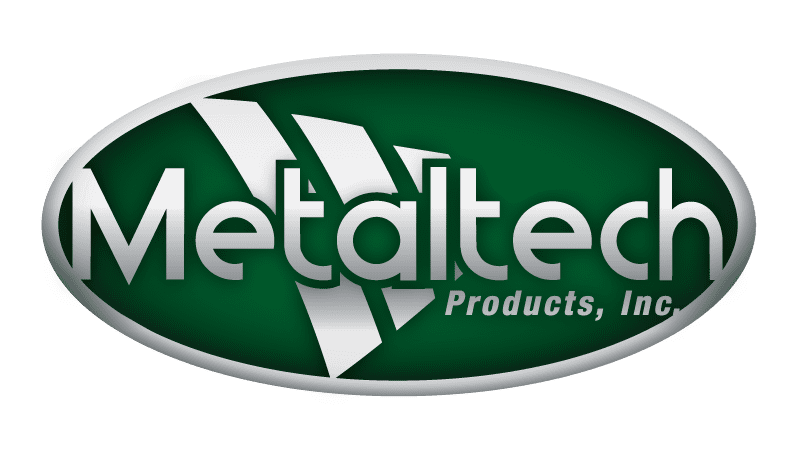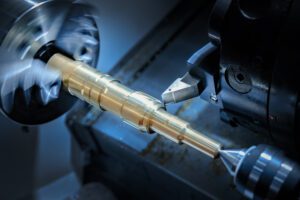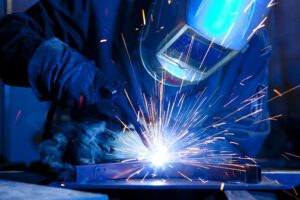Metal fabrication companies dabble in more than steel and aluminum. Many metal fabricators can also bend and shape polycarbonate (PC), a type of plastic.
Automotive and electrical components, roofing materials, and consumer products like headlamp lenses use polycarbonate plastic. As an engineering thermoplastic, polycarbonate can be heated and melted without losing its characteristics.
Do you want to work with polycarbonate? Custom fabrication companies like Metaltech Products can help! Learn more about cutting and machining polycarbonate materials.
A Brief History of Polycarbonate Materials
Global demand for polycarbonate is growing as more manufacturers use it for vehicle and construction components. But this thermoplastic hasn’t always been around. The British Plastics Federation describes the origin story of polycarbonate.
Flashback to 1898. Chemist Alfred Einhorn created the first polycarbonate solid. Later, in 1902, chemists Bischoff and Hedenström found a similar solid.
Polycarbonate of a high molecular weight wasn’t found until 1953. General Electric and Bayer began developing polycarbonates for commercial use after employees of both companies discovered the plastic.
Characteristics of Polycarbonate Plastics
Transparent. Rigid. Tough. Manufacturers use polycarbonate plastics because they are strong and have excellent thermal stability.
Polycarbonate materials thrive in temperatures from -4 to 284℉ (-20 to 140℃). They maintain rigidity up to 284℉ and toughness down to -4℉. These plastics begin to melt at 500 to 600℉ (260 to 320℃). At room temperature, polycarbonate materials are ductile and can be machined.
According to the European Polycarbonate Sheet Extruders (EPSE), polycarbonates have three advantages:
- Strong. Polycarbonate plastics are almost unbreakable. They can withstand great force. They’re also thermally resistant up to 275℉, or 135℃.
- Durable. These materials are resistant to fire and impacts. While polycarbonate plastics have high impact resistance, they can be easily scratched. Therefore, they must be coated in harder materials to prevent scratches.
- Sustainable. Polycarbonate is a thermoplastic, meaning you can form it without changing its characteristics permanently. Thermoplastics are recyclable because of this reason. You can continue to melt and shape them.
Considerations for Polycarbonate Components
The downside of polycarbonate is its weak resistance to scratches and UV light. On its own, polycarbonate material lacks resistance to surface scratches and yellowing from long-term UV exposure. The solution? Manufacturers add coatings to polycarbonate to prevent scratching and yellowing.
Are you considering polycarbonate for your part material? Think about what the part will be exposed to while in use. You’ll need protective coatings if the end product exists in an environment where exposure to light or scratching hazards is likely.
Cutting and Machining Polycarbonate
Polycarbonate can be bent, sawed, drilled or milled at room temperature. Like metals, you can cut polycarbonates to custom sizes. There are several methods fabricators use to cut and machine polycarbonate materials.
-
- CNC mill. In a fabrication shop, CNC machines often cut polycarbonate sheets. These machines offer detailed accuracy. They can create specific shapes or produce holes in the sheet. Since it is automated, a CNC mill is suitable for high-volume projects.
- Programmable band saw. Using a fine-tooth blade, you can cut through polycarbonate material with a band saw. When you want uniform, straight cuts, a programmable band saw can help you achieve them.
- Manual cold saw. Polycarbonate tubes may require a manual cold saw. Depending on the project, a manual cold saw may work better for simple cuts to shorten tubes. Most often, manual tools are better for smaller projects.
- Horizontal lathe. Another option for cutting polycarbonate tubes is a horizontal lathe. You can achieve more precision with a lathe than with a manual cold saw.
Explore Polycarbonate FAQs
Don’t feel confused about polycarbonate sheets and tubes! If you have a question about polycarbonate materials, please reach out to Metaltech. We can help you determine if polycarbonate is the best choice for your application.
Are polycarbonate sheets good for roofing materials?
Some people worry polycarbonate may make for a hot roof. You can use polycarbonate sheets with energy reflective coatings to prevent roofing from becoming too hot.
Is polycarbonate bulletproof?
By itself, polycarbonate is not bulletproof. However, you can purchase polycarbonate laminates specially designed to be bullet-resistant.
Is polycarbonate toxic?
Polycarbonate does release bisphenol A (BPA). Some research has shown that small amounts of BPA from plastic containers can seep into food and beverages. However, the FDA reports that BPA is safe at its current levels for food packaging.
If you’re concerned about using polycarbonate in food applications, you can use a BPA-free polycarbonate or consider other materials.
Will polycarbonate discolor over time?
Polycarbonate yellows with extended exposure to UV light. If the application requires, you can apply a UV-resistant coating to polycarbonate to extend its life.
How do you bond pieces of polycarbonate? Can you join them together?
You can bond polycarbonate materials with adhesives or solvent welding. You can also join pieces with fasteners.
What are common polycarbonate brands?
Makrolon® and Lexan® are both brand names for polycarbonate sheets. Bayer produces Makrolon®, and General Electric makes Lexan®.
Get in Touch With a Fabrication Shop
Whether you want to work with polycarbonate or metal, our engineering and fabrication team help you manufacture the components you need. We help you design, prototype and produce custom parts.
Start your custom fabrication project. Please request a quote to talk with our team. We’re ready to work with you!





